As a grower focusing on the market's upper end, with herbs and special cress - in itself, a niche product - some varieties will, invariably, not make the cut. That is no different at Koppert Cress, in the Netherlands. Especially during the past 18 months of the global pandemic.
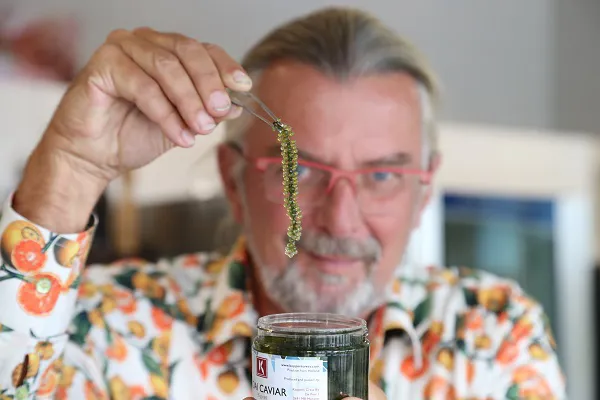
Moai Caviar
What is different is how they market their product. Restaurants were closing, and so they were looking for new ways to introduce people to healthy food. That was amid all the personal and financial setbacks. They also wanted to introduce new varieties. Thus, Koppert Cress dared to put two new products on the market.
One of the new varieties is Moai Caviar. This green sea grape is grown in a greenhouse right in the Netherlands. "For us, too, it's something genuinely new and different," says Stijn Baan. He is Rob, the company’s founder’s son. "It takes real guts for a company to introduce this underwater vegetable. It’s a true luxury product, and its cultivation is very complex. Yet, we persevered when it was very difficult. And we’ve managed to inspire great chefs all over the world."
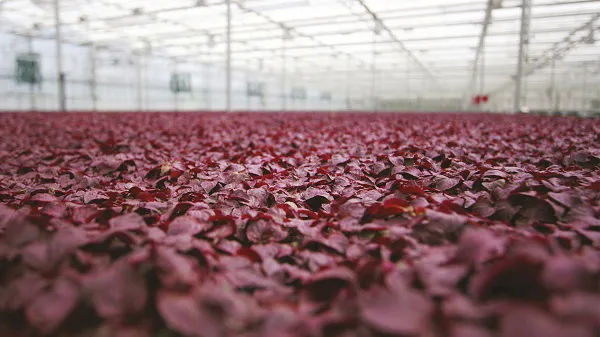
This sea grape was launched in partnership with Jonnie Boer, a well-known Dutch chef. Koppert Cress keeps in close contact with these culinary creatives. "Our products are in the upper segment. That's where new initiatives and products originate. New products you then encounter years later in supermarkets and delivery services too."
They launched another product during the pandemic - Kyona Mustard Cress. “Many chefs asked us for this.” Such inquiries arise, for example, when chefs take a trip. And come across something they would like to cook with. "That’s when they approach us to see if we can make something out of it. Sometimes products come in a different form. The challenge is then to transform it into cress,” Stijn explains.
Always a lot happening
There is always a lot going on. “Doing new things is truly in Rob’s DNA. He's also always looking for new plants." Is that more difficult now during COVID-19 time with the travel restrictions? No, answers Stijn. "It’s wrong to think new things can only be found in distant, tropical places. Here in Western Europe, too, there are still many treasures to be discovered. The plant world is still so rich. What we know now is truly just the tip of the iceberg."
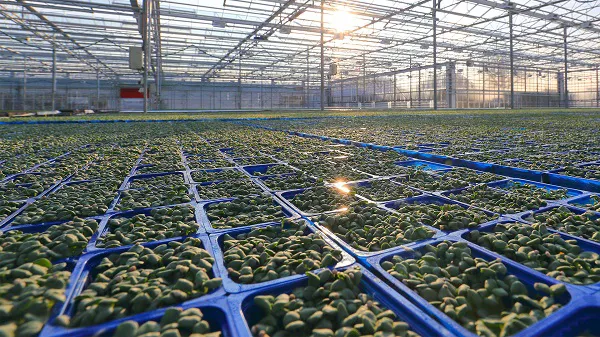
The Koppert Cress assortment currently has about 60 varieties. They introduce about five more every year. "If it were up to Rob, there would even be ten," laughs Stijn. Michiel van der Spek, Marketing Communications Manager, says there will be new introductions this year too. That is despite the COVID-19 crisis. "We have many varieties we can introduce immediately if we want to. I can't tell you much about it yet, but some great things are coming. Revolutionary things too, when it comes to flavor and cultivation method.”
Trust Koppert Cress to tease us a little. This cress growing company is also busy setting up a new greenhouse at the moment. It is opposite the main location. That too will feature 'surprising products'. "As people have come to expect, our products should be impossible, but we do them anyway,” Rob said in September 2020. They sold one of their greenhouses to a fellow grower earlier this year. And they discontinued some products. That is nothing unusual.

"It would be crazy if you introduced about five new varieties every year and didn't also cut some varieties. The pandemic made it easier to get rid of several products. There are always species of which we have only a few. And those we keep, more out of love, than from a commercial point of view. Ultimately, you have to make choices," says Stijn.
Developments
Speaking of choices - as soon as the global pandemic hit last year, Koppert Cress decided to get creative. For example, they set up a drive-thru at their main location to sell products. They successfully tapped into the delivery market and took a step towards supplying supermarkets. "It was great that we managed to do that with the Restaurant Vegetable Box. That was in collaboration with Albert Heijn [supermarket], Rungis [a wholesaler], and other hospitality industry growers."
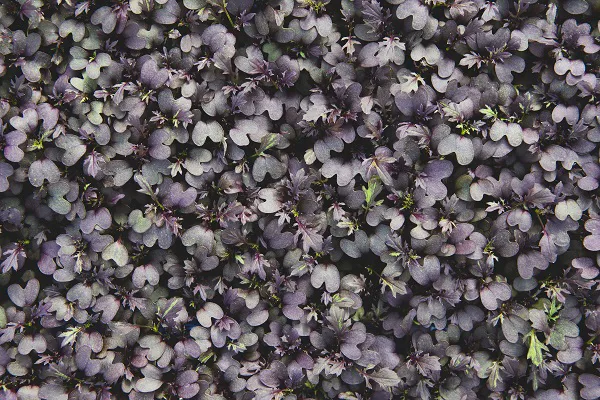
Kyona Mustard
"We managed to do it in a very short time. We hadn’t pulled that off with our products before. They’re not typical consumer products,” Stijn adds. He points out that it was a one-off. "It wouldn’t be very realistic to think we’d get permanent shelf space. Also, we can't suddenly focus entirely on consumers either. For that, we’d have to turn our whole business around. We still have a long way to go before people are totally familiar with cress. It will take a few more years."
That is progressing, though. That's thanks to things like the delivery services set up by restaurants and chefs. "We’ve been quite taken with these delivery services. We have cress variants of many recognizable flavors, and they’ve done well. Think of basil or broccoli-flavored cress. These flavors are very concentrated and therefore much stronger. They’re true vitamin bombs," says Stijn.
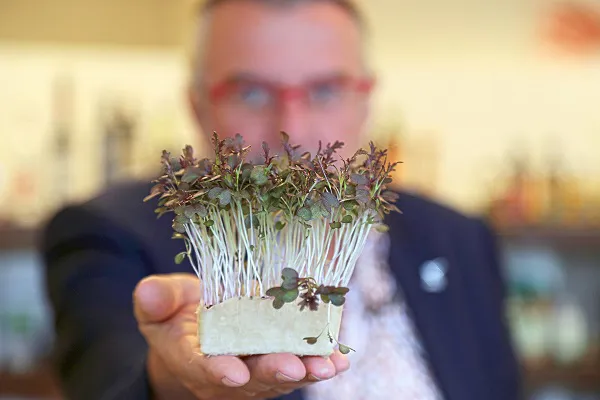
The chefs gave shoppers a lot of information, explaining these special products. "That also allowed us to have a different kind of contact with chefs. We examined our role and started inspiring chefs about what they could do with delivery services. Not that we were the only great example. However, we could share great things during several discussions with the chefs,” continues Michiel.
Again, the chefs ultimately pick their products and, thus, introduce the public to them. As a result, consumers now sometimes even ask cress growers where they can get these products. "We are often asked, 'Where can I buy it myself?' Not in the supermarket. You can get these from us, or our webshop. We opened this during the pandemic. It was always on the cards, but those plans just got speeded up and implemented," Michel says.
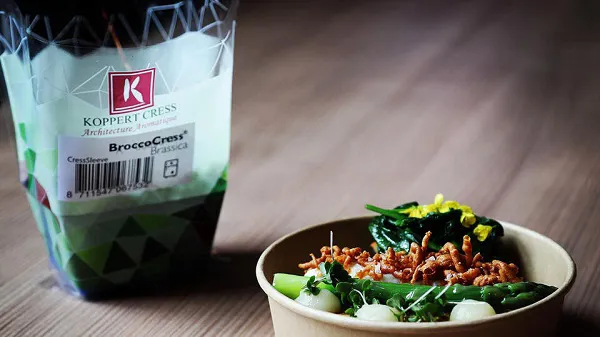
People could shop at hospitality wholesalers for a short time too. "So, the threshold for consumers to buy our products was temporarily lower," says Stijn. He thinks their webshop will remain. "If we remove it now, we'll be in trouble,” he laughs. “We really owe it to the people, I think. We mustn’t disappoint our new fans. There are still people who collect products from us every week. They buy for health reasons, not because they necessarily want to cook at chef level. It's nice to see our products also being appreciated at other levels."
No difference
You can find Dutch Koppert Cress abroad too. This company’s brand has a foothold there as well. In the United States, Flavor Fields has been growing cress since 2006. They were one of the first there. They grow, among other things, the Koppert Cress brand cress. And the cress grower is also active in Turkey, Japan, and South Korea. We asked about the differences between the COVID-19 situation and cress sales in the Netherlands. Stijn says the American market is very similar to that in the Netherlands.
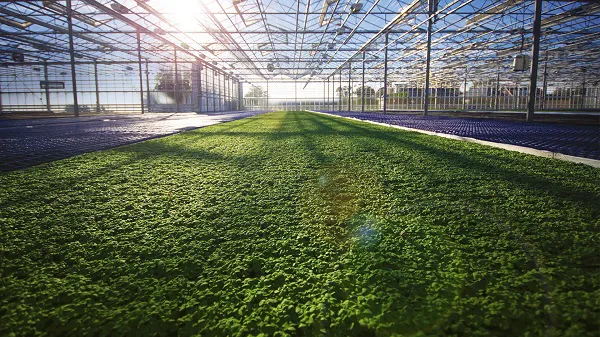
But, in Asia, there are more differences. "In Japan, our product is available everywhere. It’s, therefore, easier for better-off people to buy. The chefs there shop at supermarkets too. There’s no division between professional buyers and consumers, like in the Netherlands. This doesn’t mean the strict COVID-19 rules haven’t also drastically reduced sales there too. Culturally-wise, people there perhaps adhere more strictly to the rules than those in the Netherlands."
There will probably still be relevant restrictions for this company for the rest of the year. Stijn points out that several fellow growers are in the same boat. "Other cress and herb growers and all hospitality growers were also hit hard. Just like that sector's trading companies. We all have the same goal: to promote healthy vegetables."
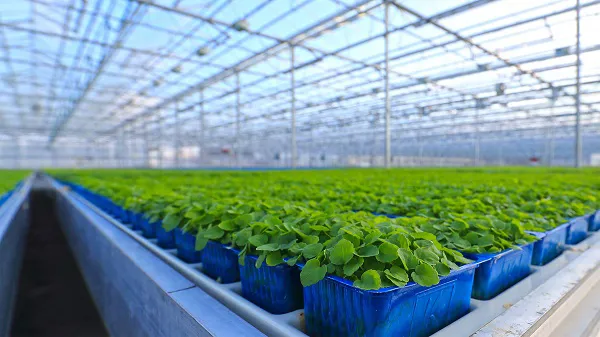
"With Rob as our vegetable ambassador, we’ll continue to do so. Even in our demo kitchen, which we happily allow our fellow growers to use. Some people will always be more active than others. But, we all know we need to consume more healthy plant-based food. Even now, during the COVID-19 pandemic, this has enjoyed far too little attention,” Stijn concludes.
 Michiel van der Spek
Michiel van der Spek
michiel@koppertcress.com
Koppert Cress
www.koppertcress.com
